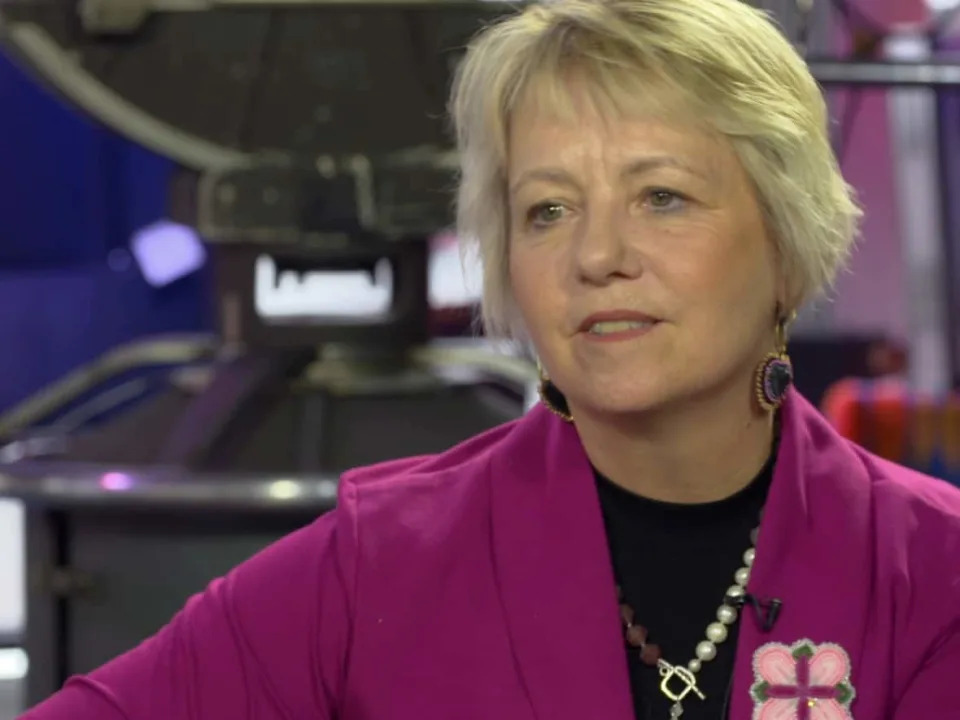BC
7 years into crisis, politicians still struggle to see drug users as people, Dr. Bonnie Henry saysWed, March 8, 2023

B.C. Provincial Health Officer Dr. Bonnie Henry spoke to CBC News in a wide-ranging interview marking three years of the COVID-19 pandemic. (CBC News - image credit)
As nearly seven people continue to die each day from B.C.'s poisoned drug supply, Provincial Health Officer Dr. Bonnie Henry says politicians are still grappling with the concept that drug users deserve to be treated like people.
In a wide-ranging interview with CBC News, Henry described the toxic drug crisis as "the most challenging issue that I've ever dealt with in public health."
One of the biggest issues when it comes to public policy, she said, is getting elected officials to shift their thinking after a century of prohibition and criminalization of drug users.
"It has been really difficult for politicians to wrap their heads around," Henry said. "These are people."
In the almost seven years since a public health emergency was declared in B.C. over illicit drug deaths, the provincial health officer says minds are beginning to change about how to approach the problem, but "slowly, too slowly."
"We're recognizing that people who use drugs are people first," she said. "They're our friends, our family, they're our colleagues, they're our neighbours."
Her words echo those of Chief Coroner Lisa Lapointe, who has said it's been a struggle to move public policy away from an ideology that suggests the only way to help drug users is to "harm them as much as we can."
Vince Tao, a community organizer for the Vancouver Area Network of Drugs Users (VANDU), said it's not just politicians who have trouble seeing drug users as human; it's also academics, researchers, police and the media.
"She's not wrong, but I would say, with all due respect, that's her job, right?" he said of Henry's comments. "Her job is to make sure that her colleagues, her cohort, understands the severity of the crisis at hand."
Tao believes real change requires more than just viewing drug users as human. He said it also requires allowing them and other marginalized people to have power and a voice in how decisions are made.
'Things got dramatically worse' during pandemic
Henry spoke with CBC News to mark three years of the COVID-19 pandemic, another public health emergency that has led to an ever-increasing number of deaths from toxic drugs.
On Tuesday, Lapointe's office released the latest numbers on the drug crisis, revealing that 211 people were killed by illicit drugs in January. The death rate that month was 47 people per 100,000, more than double what it was in April 2016, when the public health emergency was declared.
Henry said it was distressing to watch as more people began using alone because of public health restrictions related to the pandemic. Other measures also caused the illicit drug supply to become increasingly dangerous.
"Because of international trade being interrupted and people making large batches on their own at home, there's no quality assurance to any of it, so things got dramatically worse," Henry said.
That includes a major spike in the deaths among men aged 30 to 59, many of whom had jobs and were using at home, without the knowledge of their families.
Watch | Provincial health officer addresses toxic drug crisis
But Henry said the pandemic also created some opportunities. Public health officials had to work closely with elected officials on how to deal with COVID-19, which resulted in more trust and openness to new ideas.
As an example, she pointed to a three-year pilot project decriminalizing personal possession of very small amounts of some drugs in B.C.
When Henry released a report in 2019 calling for similar measures, "it was dismissed by government," she said.
"Having built that relationship of trust through the pandemic enabled us to have a conversation and to go back and say, look, read this again, let's think about this," she said.
That the province went on to apply for an exemption from federal drug laws, and that some version of decriminalization was approved is "a massive step forward" in Henry's mind.
"They call it a pilot program. I cannot see us going back from this," she said. "What we need to do is ensure that it is implemented, that we take the criminal justice system out of people's lives."
She said she's spoken to mothers who are afraid to ask for help with addiction because they're scared of being labelled as criminals and losing their children. Henry hopes decriminalization will take away some of those fears.
But B.C. still has a long way to go in terms of policies to stop the flood of drug deaths, she added.
That includes expanding access to prescribed safer supply, which is still reaching only a small percentage of drug users and is not available in many communities.
It also includes reforming the treatment and recovery system, which is not subject to provincial regulation ensuring facilities are using evidence-based methods and employing qualified staff.
"We have no system," Henry said. "There's never been a system to understand who's in there, how well they do, how often people relapse."
In the end, though, the drug crisis isn't just about drugs in Henry's mind. It's about overlapping, systemic issues including B.C.'s fragmented mental health-care system, homelessness and incomes that don't cover the cost of living in this province.
"It is more than just one thing," she said.
No comments:
Post a Comment